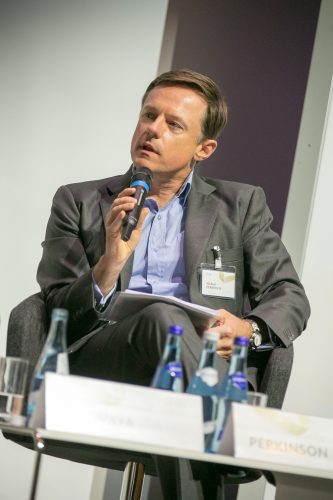Michael Perkinson is the chief of staff to the chief investment officer at the asset management firm Guggenheim Partners in the US. On 28 and 29 August he took part in a meeting of the Alpbach-Laxenburg Group, focused on new models for sustainable business development, and on 30 August he spoke at the European Forum Alpbach Political Symposium.
As a business leader with a background in international relations, you have unique experience in both government and the private sector: How do you think that the two could work together towards achieving the sustainable development goals?
Traditionally, the two sectors have not mixed well. Governments were skeptical of the private sector’s profit motives and the private sector believed government was an impediment. Both views were, of course, short-sighted. In recent years the United Nations has looked to the private sector to help finance development as the traditional levels of fiscal policy have been removed from the toolkit by increasingly narrowly focused legislatures. Similarly, private investors and private enterprise, who make up over 60% of GDP in the developed world, realize that they can partner with governments to achieve their social goals. Yes, businesses now have social goals.
What do you see as the biggest challenge is in achieving the SDGs?
Money and willpower.
What changes would be needed in business in order to fully embrace the SDG agenda?
I suspect that businesses need to understand how they can contribute. If given the option of a regulation or a tax, businesses will always chose a tax, because it allows them to plan accordingly. So, in this case, I think businesses require an explanation as to how they can contribute and how it won’t interfere with their executing on their business plan.
Business is often seen as “part of the problem” when it comes to issues like climate change and poverty – do you think that sustainable development could also bring opportunity for business, and if so, how?
Having been in the public sector for 25 years before returning to the private sector, I have never seen the private sector as part of the problem. In the United States, the private sector contributes some 80% of GDP. The private sector also provides jobs, which is really the only way that poverty can be eliminated on a generational scale. I think that there is ample opportunity for business to contribute to the SDGs, but the public sector needs to explain clearly how businesses can contribute in a way that doesn’t interfere with their business plan. It doesn’t mean that businesses need an inducement (like a tax break), they just need to understand the strategic logic of the concept.
Interview conducted and edited by Katherine Leitzell, IIASA science writer and press officer
Note: This article gives the views of the interviewee, and not the position of the Nexus blog, nor of the International Institute for Applied Systems Analysis.



You must be logged in to post a comment.